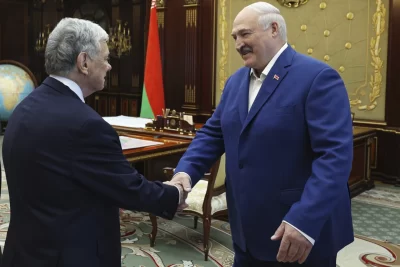Both Kosovo and Serbia want to join the EU, which has told them that they first need to sort out their differences.
Western powers want Kosovo and Serbia to implement a 10-point plan put forward by the EU in February to end months of political crises. Kurti and Vucic gave their approval at the time, but with some reservations.
The EU and U.S. are pressuring Kosovo to allow for the creation of an Association of the Serb-Majority Municipalities to coordinate work on education, health care, land planning and economic development in communities of northern Kosovo mostly populated by ethnic Serbs.
Pristina fears such an association would be a step toward creating a Serb mini-state with wide autonomy, similar to Republika Srpska in Bosnia.
Lajcak urged Kosovo’s government “to move on the establishment of the association of Serb-majority municipalities in Kosovo without further delay.”
“Without this, there will be no progress on Kosovo’s European path,” he said.
The EU suspended funding some projects in Kosovo and halted visits by its top diplomats in July over the issue.
Later in Belgrade, Lajcak said “we have to be very clear that we strongly condemn terrorist attack on Kosovo police on the 24th of September.”
“All perpetrators need to be brought to justice and we expect Serbia’s full cooperation and concrete action in this regard,” he added.
Serbia has denied involvement in the attack, saying it was organized by ethnic Serbs in Kosovo. The ringleader, Milan Radoicic, an ally of Vucic, was briefly detained in Serbia and later released pending further proceedings.
Vucic said on Instagram after the meeting that he believed “we will find a way out of the crisis in the coming period.” He said he expected ”important meetings” in Brussels in the days ahead. He did not elaborate.
The last Kosovo-Serbia normalization talks took place in mid-September, before the flare-up in northern Kosovo. It’s unclear when another round of meetings might take place.
Kosovo has called on Europe to sanction Serbia, which it blames for the Sept. 24 violence, saying no further talks could be held and demanding higher security measures from Western powers to deter an increased presence of Serb military forces along its border.
NATO has bolstered a peacekeeping force in Kosovo, which normally has a troop strength of 4,500, with an additional 200 troops from the U.K. and more than 100 from Romania. It also sent heavier armaments to beef up the peacekeepers’ combat power.





